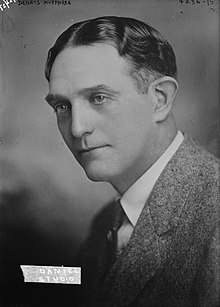Dennis Murphree
Dennis Murphree | |
|---|---|
 | |
| 42nd and 47th Governor of Mississippi | |
| In office December 26, 1943 – January 18, 1944 | |
| Preceded by | Paul B. Johnson Sr. |
| Succeeded by | Thomas L. Bailey |
| In office March 18, 1927 – January 17, 1928 | |
| Preceded by | Henry L. Whitfield |
| Succeeded by | Theodore G. Bilbo |
| 20th, 22nd, and 24th Lieutenant Governor of Mississippi | |
| In office January 15, 1940 – December 26, 1943 | |
| Governor | Paul B. Johnson Sr. |
| Preceded by | Jacob Buehler Snider |
| Succeeded by | Fielding L. Wright |
| In office January 19, 1932 – January 21, 1936 | |
| Governor | Martin Sennett Conner |
| Preceded by | Bidwell Adam |
| Succeeded by | Jacob Buehler Snider |
| In office January 22, 1924 – March 18, 1927 | |
| Governor | Henry L. Whitfield |
| Preceded by | Homer H. Casteel |
| Succeeded by | Bidwell Adam |
| In office November 1911 – January 22, 1924 | |
| Personal details | |
| Born | January 6, 1886 Pittsboro, Mississippi, U.S. |
| Died | February 9, 1949 (aged 63) Pittsboro, Mississippi, U.S. |
| Political party | Democratic |
| Spouse | Clara Martin |
Dennis Herron Murphree (January 6, 1886 – February 9, 1949) was an American politician. He served three separate terms as Lieutenant Governor of Mississippi and two as Governor of Mississippi.
Biography
[edit]He was born on January 6, 1886, the son of Thomas F. Murphree and Callie (Cooper) Murphree.[1] He was a member of the Mississippi House of Representatives from 1911 to 1923. In March 1927, he became Governor of Mississippi after the death of incumbent Henry L. Whitfield. He served for about ten months until Theodore G. Bilbo, who defeated Murphree in the Democratic Party primary by 10,000 votes, was sworn into office in January 1928. Defeat has been attributed in part to his having prevented a lynching in Jackson (he mobilized the National Guard and threw up a barbed-wire barricade around the jail).[2] With the death of Gov. Paul B. Johnson Sr. in December 1943, Murphree finished out the three weeks left in Johnson's term, serving until the swearing-in of Thomas L. Bailey in January 1944.
Dennis Murphree conceived the idea of the Know Mississippi Better train in 1925 in response to Governor Whitfield's wish to create an exposition of Mississippi for the rest of the country. The train was successful and continued to tour annually until at least 1937. The train visited forty-seven other states, Canada, and Mexico, and showcased the state's industry, entertainment, and commerce sectors.
References
[edit]- ^ History, Mississippi Department of Archives and (1917). The Official and Statistical Register of the State of Mississippi. Department of Archives and History.
- ^ Butler, Hilton (July 22, 1931). "Lynch Law in Action". The New Republic. Archived from the original on March 25, 2003. Retrieved April 20, 2018.
External links
[edit]- Dennis Murphree's grave at Find-A-Grave
- Profile at National Governors Association website
- The Story of the "Know Mississippi Better" Train Archived July 27, 2011, at the Wayback Machine


 French
French Deutsch
Deutsch